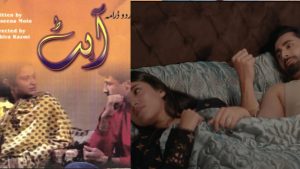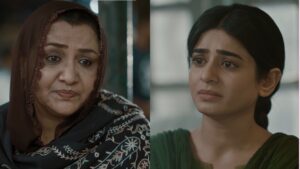If we were to tell you that there’s a drama out there that candidly discussed the toxic pressure on women to give birth to sons, domestic violence and marital depression, your first assumption would have been that this drama was released in the recent few years. But nope this was one of Haseena Moin’s underrated but excellent drama called ‘Aahat’ which aired in 1991, and had more to say about women’s mental health and domestic violence than current dramas do today.

The seven episode drama revolved around a mother Rabya (Sania Saeed) who is unhappy in her marriage because of how her mother-in-law keeps pressuring her to give birth to a son after having three daughters. After the fourth daughter is born, Rabya falls in to depression because of how her in-laws pressure her to give the child away to her husband’s sister, who didn’t have a child and so that this decision might help the family relieve their financial pressure. Rabya is subjected to numerous humiliating situations at the hands of her mother-in-law such as sitting for rituals with a peerni, or watching her young daughters get taunted as ‘burdens’ and made to do chores by their grandmother despite being so incredibly young.
The beauty of ‘Aahat’ that current dramas today can never capture is how much female friendships can help women escape their toxic environments, that Moin had shown through the friendship between Rabya and Dr Naheed. Naheed was the one who rescued her maid when she was being severely thrashed by her alcoholic husband, and firmly stands behind Rabya when she was blamed for not giving a son to the family. She is the sole person who recognised Rabya’s post-partum depression, and pushed her to stand up for herself to the rest of her family.
Compared this gorgeous serial to today, it seems like we’ve not only regressed back several years but keep finding more ways to dismantle all the efforts made by Haseena Moin to destroy any kind of strong female representation within our television screens. Shows like ‘Mann Mast Malang’ starring Danish Taimoor and Sahar Hashmi are among the most watched dramas on digital platforms today but the entire plot makes 50 shades of grey look like a nursery rhyme. Several clips from the drama have trended on social media, one in which the hero Kabir ties up his wife Riya in ropes, and yells at any other woman who tried to question the absurdity behind all of this.
50 shades of gluta taimoor (paki-version )pic.twitter.com/F80zW9O5QM
— bella ྀི (@bellashiding) May 26, 2025
It’s not surprising that Nooran Makhdoom is the mastermind behind this drama, as she also wrote another toxic love story ‘Tere Bin’ where several scenes featured the heroine getting slapped by her husband, is barred from going outside the house after her marriage or even from pursueing her law degree.
I’m opposed to women being slapped, but a slap on Behaya’s face would serve #Terebin pic.twitter.com/Bt6F8GUNLA
— shiza (@blearyeyess) June 29, 2023
Now more than ever, it’s incredibly important that we hold our drama writers and producers accountable for the content they are creating, because the kind of sexist logic and behaviour they are pushing on our screens in the name of ‘entertainment’ is the reason why more men feel entitled to a woman’s body and has led to tragic murders like Sana Yousaf’s death. Sana Yousaf was killed simply because she rejected a man’s romantic advances, who was 22 years old compared to her being 17. How many times have we seen this kind of toxic behaviour on our screens which has been romanticised as ‘love’?
While Haseena Moin dedicated her entire career to emphasising on the need of strong female friendships, and how they can help women survive any hardship that comes in their way, today’s writers have dismantled that legacy with the way they prioritise profit over good content. Moin’s dramas like ‘Parosi’, ‘Ankahi’ or even ‘Aahat’ revolved around strong women helping each other to overcome their traumas and living on their own terms but its depressing that 34 years later, the writers that have taken her position would rather use their power to glamorise toxic relationships rather than encourage women to recognise them and leave.
Read more:








